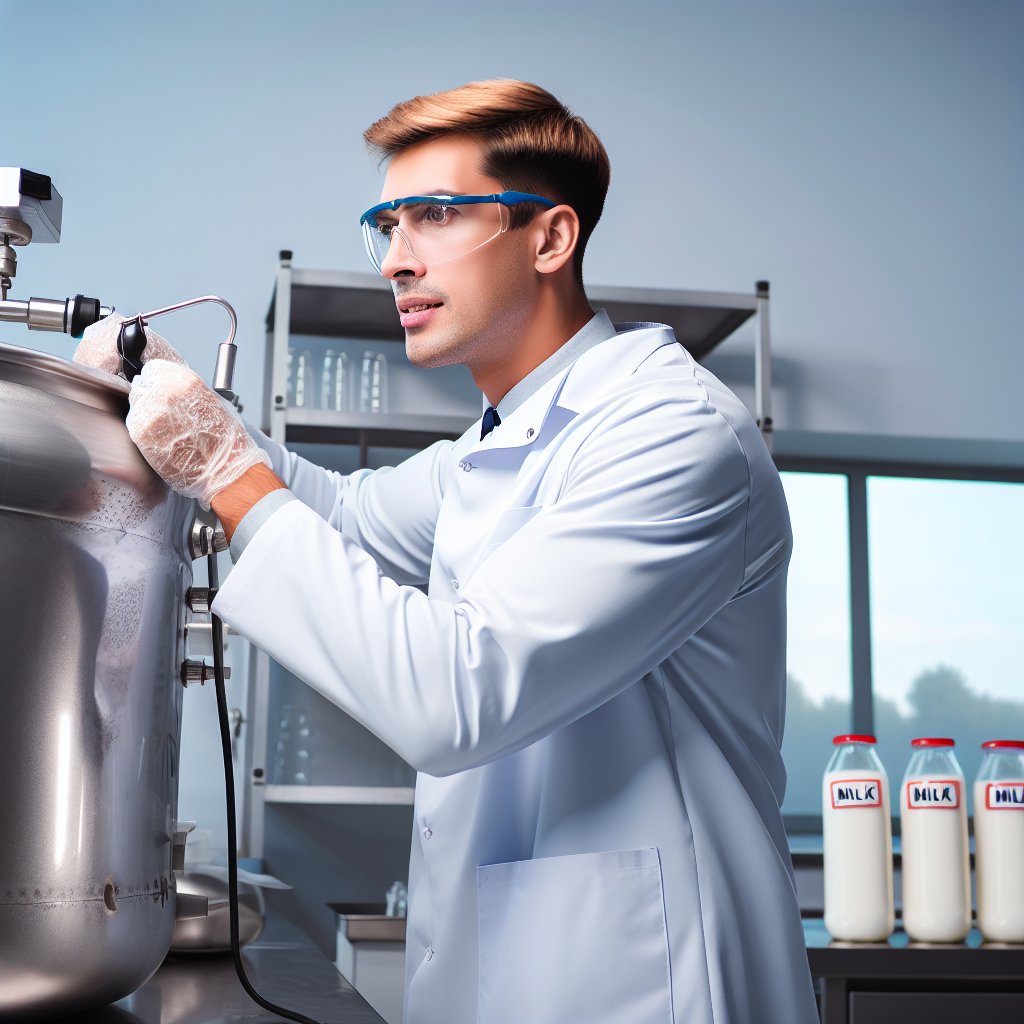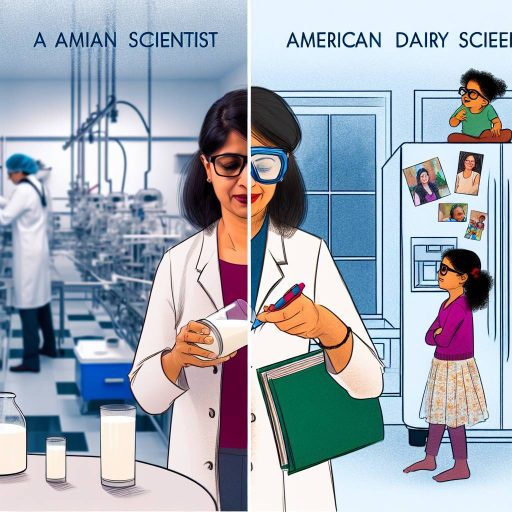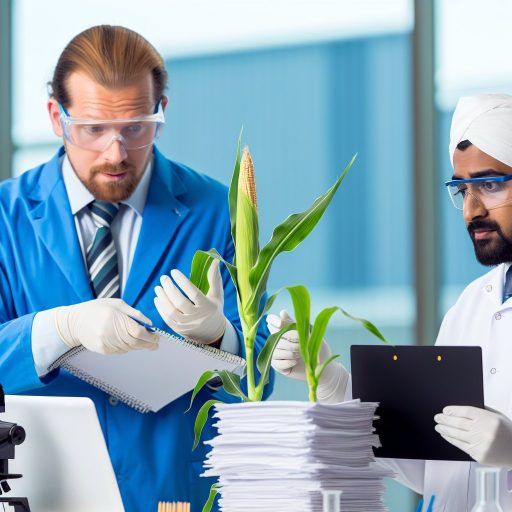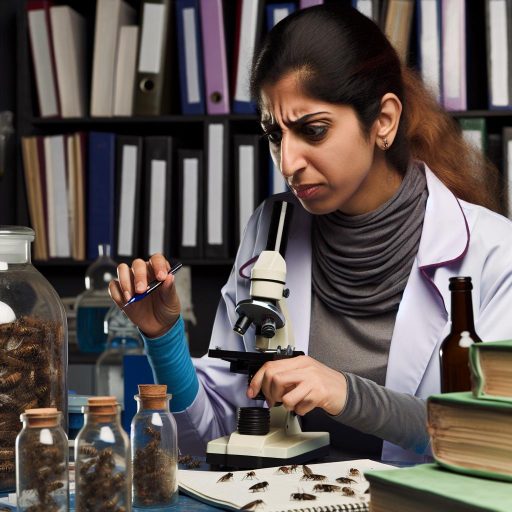Introduction:
Dairy scientists play a crucial role in the milk pasteurization process.
They ensure milk safety and quality.
Pasteurization involves heating milk to eliminate harmful bacteria.
This process extends its shelf life, making it essential for public health.
Duties of Dairy Scientists in Pasteurization:
- Conducting research to improve pasteurization methods for maximum effectiveness.
- Monitoring and adjusting pasteurization temperatures and times to meet safety standards.
- Collaborating with industry partners to implement best practices in milk processing.
Significance of Pasteurization:
Pasteurization is vital for preventing foodborne illnesses and ensuring the milk is safe for consumption.
Process Overview:
- Raw milk is heated to a specific temperature (usually around 161°F) for a set amount of time.
- This kills harmful bacteria while preserving the nutritional value and flavor of milk.
- Once pasteurized, the milk is rapidly cooled and then packaged for distribution.
Maintaining Dairy Product Quality:
Dairy scientists’ expertise in understanding the science behind pasteurization is essential.
They help maintain the quality and safety of dairy products.
Dairy Scientist’s Responsibilities:
When it comes to milk pasteurization, dairy scientists play a crucial role in ensuring the safety and quality of the final product.
Let’s delve into their specific tasks and responsibilities in this process:
Developing Pasteurization Protocols:
Dairy scientists are responsible for developing and designing pasteurization protocols that meet regulatory standards and ensure the effective elimination of harmful pathogens in milk.
Implementing Pasteurization Processes:
Once the protocols are established, dairy scientists oversee the implementation of pasteurization processes in dairy plants to guarantee that the milk is treated properly and safely.
Monitoring Temperature and Time:
One of the key responsibilities of dairy scientists is to monitor and control the temperature and time parameters during the pasteurization process to ensure proper heat treatment of the milk.
Ensuring Product Quality:
Dairy scientists are tasked with ensuring that the pasteurized milk meets quality standards in terms of taste, texture, color, and overall sensory attributes that are appealing to consumers.
Conducting Microbiological Testing:
They also conduct microbiological testing to verify the effectiveness of pasteurization in reducing microbial load and eliminating harmful bacteria to make milk safe for consumption.
Quality Assurance and Control:
Dairy scientists are involved in quality assurance and control measures to prevent contamination and maintain the integrity of the pasteurized milk throughout the production and distribution process.
Problem-Solving and Troubleshooting:
In case of any deviations or issues during pasteurization, dairy scientists use their expertise to troubleshoot problems, identify root causes, and implement corrective actions promptly.
Collaborating with Production Team:
Dairy scientists work closely with the production team to ensure smooth operations, provide training on best practices, and maintain a high level of hygiene and sanitation in the processing plant.
Research and Development:
They are also involved in research and development activities to innovate new pasteurization techniques, improve efficiency, and enhance the safety and shelf-life of pasteurized dairy products.
Continuous Improvement:
Lastly, dairy scientists are committed to continuous improvement by staying updated on the latest technological advancements, regulatory requirements, and industry trends to enhance milk pasteurization processes.
Dairy scientists play a critical role in milk pasteurization by ensuring the safety, quality, and compliance of pasteurized milk through their expertise, attention to detail, and commitment to excellence.
Transform Your Career Today
Unlock a personalized career strategy that drives real results. Get tailored advice and a roadmap designed just for you.
Start NowTechnology and Equipment:
Dairy scientists use a variety of equipment in the milk pasteurization process.
The most common equipment includes pasteurization tanks, heat exchangers, and homogenizers.
Pasteurization tanks are used to heat the milk to a specific temperature for a certain period.
Heat exchangers help in rapidly cooling the milk after the heating process.
Homogenizers are used to break down fat particles in the milk for uniform distribution.
Evolution of Technology:
Over the years, technology has evolved to make pasteurization more efficient and effective.
Automation has played a crucial role in streamlining the pasteurization process.
Automated systems can precisely control temperature and timing, reducing human error.
Continuous pasteurization systems have replaced batch processing, improving productivity and consistency.
New technologies, such as ultra-high temperature (UHT) processing, have extended shelf life without compromising quality.
Importance of Maintenance:
Proper maintenance and calibration of equipment are essential for optimal pasteurization results.
Regular maintenance ensures that pasteurization tanks and heat exchangers are in good working condition.
Calibration of equipment guarantees that temperature and pressure settings are accurate for effective pasteurization.
Failure to maintain and calibrate equipment can lead to under or over-pasteurization, affecting both quality and safety.
Dairy scientists must follow strict protocols for equipment maintenance to uphold industry standards.
Ensuring Safe and High-Quality Milk:
Technology and equipment play a crucial role in the milk pasteurization process.
With advancements in technology and proper maintenance of equipment, dairy scientists can ensure safe and high-quality pasteurized milk for consumers.
Learn More: Common Plant Diseases Plant Pathologists Study
Quality Control:
Dairy scientists play a crucial role in maintaining quality control measures during pasteurization.
They monitor temperature, time, and other factors to ensure proper pasteurization of milk.
Transform Your Career Today
Unlock a personalized career strategy that drives real results. Get tailored advice and a roadmap designed just for you.
Start NowAdherence to strict guidelines and regulations is essential to ensure the safety and quality of the final product.
- Dairy scientists play a crucial role in maintaining quality control measures during pasteurization.
- They monitor temperature, time, and other factors to ensure proper pasteurization of milk.
- Adherence to strict guidelines and regulations is essential to ensure the safety and quality of the final product.
You Might Also Like: Trends in Veterinary Technician Employment
Testing and Analysis:
Dairy scientists utilize various testing methods to confirm pasteurization efficacy.
Microbiological testing plays a crucial role in ensuring the safety of milk products.
Data analysis is essential for continuously improving pasteurization processes.
- Testing methods
- Microbiological safety
- Data analysis for improvements
Discover More: Irrigation Specialist: Job Description and Duties
Research and Development in Dairy Science
Dairy scientists are constantly researching to enhance milk pasteurization techniques.
Staying updated with advancements is crucial for improving milk quality and safety.
Ongoing research efforts focus on reducing pathogens and enhancing nutritional value.
Exploration of new methods like high-pressure processing and pulsed electric fields is essential.
Collaborations between scientists and industry partners drive innovation in pasteurization.
Investing in research is important to meet consumer demands for safer dairy products.
Research is key to addressing emerging challenges such as antibiotic resistance in pathogens.
Development of new technologies like UV-C light treatment enhances milk pasteurization.
Continuous improvement in pasteurization techniques helps extend the shelf life of dairy products.
Research also focuses on sustainability aspects such as reducing energy consumption in pasteurization.
By staying current with advancements in dairy science, dairy scientists ensure they can effectively address the evolving needs of the industry.
Through ongoing research and development efforts, these professionals strive to improve the quality and safety of dairy products like milk.
One of the key areas of focus for dairy scientists is the exploration of new technologies and methods to enhance the pasteurization process.
By investing in research, these scientists discover innovative techniques such as high-pressure processing and pulsed electric fields.
Transform Your Career Today
Unlock a personalized career strategy that drives real results. Get tailored advice and a roadmap designed just for you.
Start NowThese methods offer potential benefits in terms of reducing pathogens and enhancing the nutritional value of milk.
Collaborations between dairy scientists and industry partners play a crucial role in driving innovation in pasteurization techniques.
By working together, researchers leverage their expertise to develop improved methods for ensuring the safety and quality of dairy products.
This collaborative approach is essential for meeting consumer demands for safer dairy products.
Research and development efforts in dairy science also focus on addressing emerging challenges such as antibiotic resistance in pathogens.
By conducting research into novel technologies like UV-C light treatment, scientists can develop more effective methods for eliminating harmful bacteria in milk.
These advancements contribute to enhancing the safety of dairy products for consumers.
Additionally, continuous improvement in pasteurization techniques helps extend the shelf life of dairy products.
By optimizing the pasteurization process, dairy scientists ensure that milk and other dairy products remain fresh for a longer period.
This not only benefits consumers in terms of product quality but also helps reduce food waste.
Moreover, research in dairy science emphasizes sustainability aspects, such as reducing energy consumption in pasteurization.
By developing more energy-efficient technologies and methods, dairy scientists contribute to the overall sustainability of the dairy industry.
This commitment to sustainability ensures that dairy products are produced in an environmentally responsible manner.
Research and development efforts by dairy scientists play a critical role in enhancing milk pasteurization techniques.
By exploring new methods, collaborating with industry partners, and staying current with advancements, these professionals contribute to improving the quality, safety, and sustainability of dairy products.
Continued research in this area is essential for meeting the evolving needs of the dairy industry and ensuring consumer satisfaction.
Learn More: Best Practices for Livestock Artificial Insemination

When it comes to milk pasteurization, collaboration with other professionals in the dairy industry is crucial for dairy scientists.
This collaboration helps ensure the proper pasteurization and overall quality of dairy products.
Importance of Collaboration:
- Brings together different expertise and perspectives
- Allows for sharing of knowledge and best practices
- Promotes innovation and problem-solving
- Helps in continuous improvement of processes
Essential Teamwork for Proper Pasteurization:
- Requires coordination among various departments
- Ensures adherence to safety and quality standards
- Facilitates smooth operations and efficient workflow
- Reduces errors and improves overall productivity
Communication Skills for Effective Collaboration:
- Clear and concise communication is key
- Active listening to understand others’ perspectives
- Respectful interactions to foster a positive work environment
- Regular feedback and updates to keep everyone informed
Collaboration with other professionals in the dairy industry is essential for dairy scientists to ensure the success of milk pasteurization processes and the high quality of dairy products.
Transform Your Career Today
Unlock a personalized career strategy that drives real results. Get tailored advice and a roadmap designed just for you.
Start NowRegulatory Compliance:
When it comes to milk pasteurization, dairy scientists play a crucial role in ensuring compliance with regulatory standards and guidelines.
These regulations are put in place to protect consumers and ensure that dairy products are produced safely and efficiently.
Dairy scientists must stay up to date on all relevant regulations and make sure that their processes meet or exceed these standards.
Role of Dairy Scientists:
- Dairy scientists are responsible for developing and implementing processes that meet regulatory requirements.
- They conduct research to stay abreast of any changes in regulations and work to adapt their methods accordingly.
- By being proactive in understanding and meeting regulatory standards, dairy scientists help prevent issues that could lead to product recalls or consumer harm.
Consequences of Non-Compliance:
- If dairy scientists fail to meet regulatory requirements in pasteurization, the consequences can be severe.
- This can result in fines, product recalls, damage to the company’s reputation, and even legal action in some cases.
- Non-compliance can also pose serious health risks to consumers if milk is not processed correctly.
Importance of Ethical Practices:
- Ethical practices are essential in milk processing to ensure the safety and quality of dairy products.
- Dairy scientists must prioritize transparency in their processes to build consumer trust and confidence.
- By upholding ethical standards, dairy scientists demonstrate their commitment to producing safe and wholesome dairy products.
Regulatory compliance is a critical aspect of the dairy scientist’s role in milk pasteurization.
By adhering to regulations, dairy scientists help protect consumers, maintain the reputation of their companies, and uphold ethical standards in milk processing.
Dairy Scientists and Milk Pasteurization
Dairy scientists play a crucial role in milk pasteurization.
They ensure the process is done correctly to eliminate harmful bacteria and pathogens.
Additionally, they monitor the temperature and time to maintain quality and safety standards.
Without their expertise, the milk supply could be at risk of contamination.
Pasteurization is essential in safeguarding public health by reducing the risk of foodborne illnesses.
It also extends the shelf life of milk, ensuring consumers receive a safe and high-quality product.
Dairy scientists are instrumental in upholding these standards.
They protect the well-being of the population through their diligent work.
It is important to recognize and appreciate the dedication and skill of dairy scientists in the industry.
Their work directly impacts the safety and quality of dairy products consumed worldwide.
For those interested in food science and technology, exploring the role of dairy scientists in milk pasteurization can offer valuable insights.
This exploration highlights a critical aspect of the dairy industry.
Additional Resources
Investigation of Avian Influenza A (H5N1) Virus in Dairy Cattle | FDA
Agricultural and Food Scientists : Occupational Outlook Handbook …
[E-Books for Sale]
The Big Book of 500 High-Paying Jobs in America: Unlock Your Earning Potential
$19.99 • 500 High-Paying Jobs • 330 pages
Explore 500 high-paying jobs in America and learn how to boost your career, earn more, and achieve success!
See All 500 High-Paying Jobs of this E-Book
1001 Professions Without a Degree: High-Paying American Jobs You Can Start Now
$19.99 • 1001 Professions Without a Degree • 174 pages
Discover 1001 high-paying jobs without a degree! Unlock career tips, skills, and success strategies for just $19.99!




